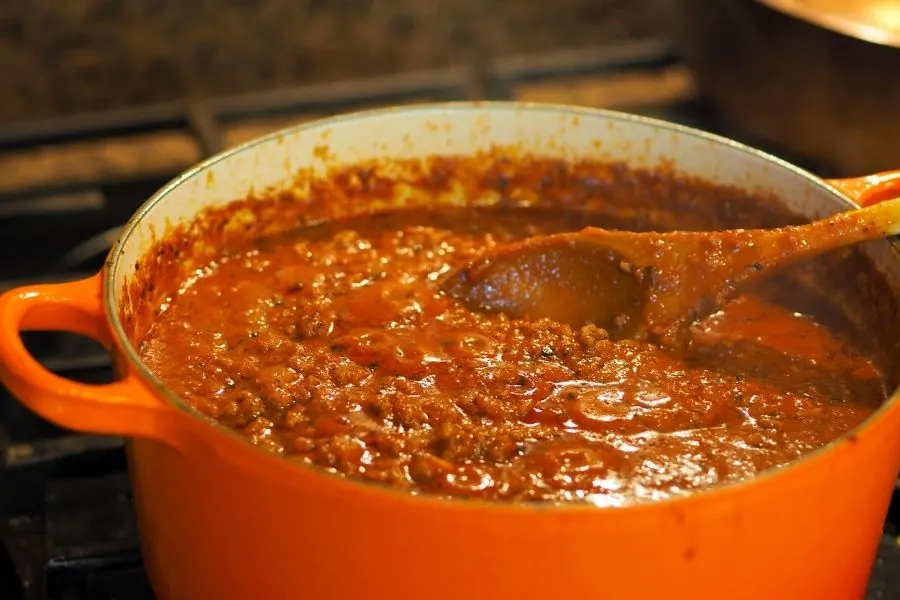You’re making your own tomato sauce at home, and you’re really proud of yourself. Whether you’re going to use it after cooking or can it for later, you’re left with a simmering pot.
Should you put a lid on it, or leave it uncovered ? There are pros and cons for each choice, but which is best when it comes to tomato sauce ? Here’s our answer.

Should tomato sauce be covered when cooking ?
Yes, you should always cover tomato sauce when cooking. Especially when you cook it for a long time on low heat. This will ensure enough moisture will remain in the sauce, and you can always leave it without a lid towards the end if it’s too thin.
Another reason to always cover tomato sauce is splatters. Hot tomato sauce splatters can and will stain everything. It’s best to avoid them, and if putting a lid on will help with the cleanup later, then so be it.
Just remember that you still need to stir the sauce every now and then. Be sure to use a thick bottom pan with a non-stick coating, just to avoid any unhappy accidents.
How long should you let tomato sauce simmer ?
Tomato sauce can simmer for as long as you want. The more you simmer it, the better it gets. This means you can simmer it for 4 whole hours if you have the time and patience for it. So if you’re wondering if you should leave the tomato sauce for more than an hour, do leave it for two. Or as long as your time allows it.
Read also: Why Are Tomatoes Different Colors ?
The more it simmers, the more the flavors will meld together. Kind of like a curry, where the sauce tastes better the more it sits. Heat helps draw out flavors much better, but so does time. Low heat and long hours make the best sauces, stews, curries, and roasts. Oh and now we’re hungry.
Can you overcook tomato sauce ?
You can overcook tomato sauce only if you don’t top up the liquid. It can be water, stock, anything you like. We really recommend adding a bit of red wine, but never top off with wine. A little goes a long way.
If your tomato sauce runs out of liquid, it will thicken and turn into a tomato paste. The more it simmers like that, the higher than chance to burn the paste and you’ll be left with a bitter sauce.
Of course, how long to cook tomato sauce does have a limit, though it’s vague. Most people don’t have the time or patience to simmer something for 12 hours, and that’s perfectly understandable.
Plus, there’s no real difference in flavor if you simmer for 8 or 12 hours. But those 4 extra hours can mean a lot of your time can be used differently.
As with anything, there’s a sweet spot. With tomato sauce it’s usually between 3 and 6 hours, though you can go longer than that. Obviously the bigger the batch the longer it should simmer.
What texture should tomato sauce be ?
The texture of your tomato sauce is completely up to you. If you like it chunky then cook it like that. If you like it smooth, blend it at the end. Just know that you risk turning it orange if you blend air into it.
What we’ve noticed is that a tomato sauce that has been simmered long enough will start to break down naturally. The flesh of the tomatoes and the onions and other veggies will break down. This will result in a mostly smooth sauce. The tomato skins are the last to break down, and they may even be there after 5 hours of simmering.

Thickening and thinning tomato sauce
You may be wondering what to do when the tomato sauce is too thick or too thin. There are ways to change the texture of your tomato sauce, and here they are.
To thicken tomato sauce you have several options. Each one works, but you get slightly different results and not all may suit your tastes. So to thicken tomato sauce:
- Add thickener like flour or cornstarch, then continue cooking until it’s completely cooked. Allow for slight loss of flavor.
- Simmer without a lit in the last hour, so enough water escapes. This preserves the most flavor but needs the most cleanup. Remember to stir or it might burn, if you let it get too thick.
If you’re like to thin out your tomato sauce, you can do it by adding liquid. This can be anything from plain cold water to veggie or chicken or beef stock.
If using stock remember that it comes with a lot of flavor, so you risk making your sauce too strong. And if adding plain water, always add cold. It slows the cooking process, but it’s much better than hot water in terms of final taste. Always adjust for seasoning at the end.
Read Also: Tomato Substitute
Why does tomato sauce leave those orange stains ?
If your tomato sauce splattered everywhere, you’re likely going to need a lot of patience to get all those stains out. Well, it turns out those stains are left by the very strong pigment found in tomatoes, lycopene. It’s a red pigment that ranged from red to yellow, and leaves orange stains on porous surfaces.
So the plasticware, the marble counter, wood, and even the sides of your mouth need some good scrubbing. Lycopene is a very oily substance, hence why it’ so stubborn to remove. You have a higher chance of getting permanent stains if it’s hot. Which is almost always the case for tomato sauce.
You’ve probably noticed you can’t remove those stains by just scrubbing with dish soap. You have two options, whichever sounds better for you and your comfort level.
You can either use diluted blech, or a baking soda solution. Both will break down the composition of the lycopene cells, thus making the stains easy to remove. We recommend heavily washing and rinsing the cookware after this treatment.
Or, you may opt for cookware that isn’t porous. The enamel on most pots is fine, and so is most non-stick coating. Try not to use aluminum pots as they will react with the initial acidity of the tomatoes and slowly break down.
Glass is also a good option, if you have such cookware. And if storing something with tomato sauce for a long time, try not to store it in plastic because it will stain. Or accept that you’ll have to throw out the container if you won’t want to use bleach of baking soda.
And there you do. Always simmer your tomato sauce with a lid on. It’s best if the lid is slightly angled, so the whole thing doesn’t just boil over (pressure). Or get a lid with one of those tiny holes.

